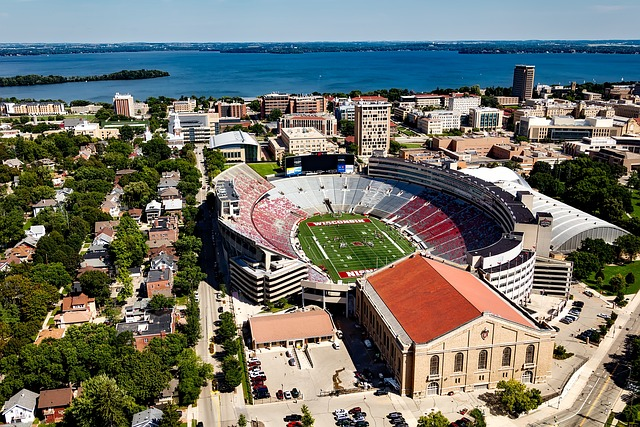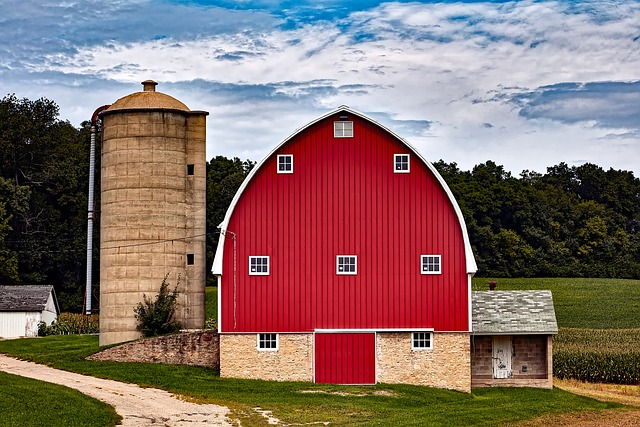
If you’re looking to purchase your next investment property, Wisconsin might not be the state at the forefront of your mind. However, with a median home value predicted to continue to increase and sale prices well below the national average, there is reason to believe this peaceful, agrarian landscape may actually be quite profitable for investors. Let’s take a look at the major industry in Wisconsin as well as the local area real estate market as well as the top 10 best places to invest in Wisconsin in the coming year.
New to passive real estate investing?
Explore Ark7 OpportunitiesTop 5 Wisconsin Employment Industries
When it comes to real estate investment, the landscape is often shaped by a combination of economic strength, growth potential, and diverse industries. Among the myriad choices available to investors, Wisconsin stands out as an attractive destination with its robust economy and varied investment opportunities. This article delves into the top five economies in Wisconsin and explains why investors should be interested in this flourishing state for their real estate ventures.
1. Manufacturing: The Backbone of Wisconsin’s Economy
Wisconsin’s manufacturing sector has long been a cornerstone of the state’s economy. Renowned for its expertise in industries such as machinery, aerospace, and food processing, the manufacturing sector offers real estate investors a unique chance to capitalize on a thriving ecosystem of industrial properties. From warehouses to production facilities, the demand for manufacturing spaces remains steady due to the state’s skilled workforce and strategic location, making it an alluring prospect for investors seeking stable, long-term returns.
2. Healthcare: Investing in Wellness
As healthcare continues to be a fundamental aspect of modern society, Wisconsin’s robust healthcare industry presents an enticing avenue for real estate investors. The state is home to world-class medical institutions, research centers, and hospitals, creating a consistent demand for medical office spaces, clinics, and related facilities. The evolving landscape of healthcare services not only ensures a consistent need for medical real estate but also positions investors to contribute to the well-being of local communities.
3. Agriculture: Cultivating Opportunities
Wisconsin’s rich agricultural heritage transcends its role as a major industry; it also opens doors for real estate investors looking to tap into the agribusiness sector. Farms, processing plants, and distribution centers play a pivotal role in the state’s economy, creating a range of real estate investment prospects. Whether it’s leasing farmland, acquiring storage facilities, or developing agro-tourism ventures, the agriculture sector offers both traditional and innovative investment avenues.
4. Tourism: Captivating Hearts and Interests
From the picturesque landscapes of Door County to the vibrant urban allure of Milwaukee, Wisconsin’s tourism industry has blossomed into a significant economic driver. The demand for hospitality establishments, vacation rentals, and event venues makes tourism-related real estate a compelling investment. Wisconsinites and visitors alike contribute to a steady stream of opportunities in this sector, making it an exciting prospect for investors who want to be part of the state’s journey in welcoming travelers.
5. Academia: Nurturing Minds and Real Estate

Wisconsin’s reputation for academic excellence extends beyond its borders, drawing students and scholars from across the country and the world. With renowned universities and research institutions, the state offers a ripe environment for investing in student housing, rental properties, and real estate developments geared towards the academic community. The consistent influx of students and faculty ensures a consistent demand for well-located and well-designed accommodations, presenting an intriguing avenue for your next investment property (via World Atlas).
Wisconsin Real Estate Market Overview
While the overall U.S. population has seen slower growth over the past year or so, there are particular areas of the country that are in fact experiencing a significant increase in a growing population over the last decade. Wisconsin happens to be enjoying a population increase, with the state clocking in at nearly 6 million residents (via. U.S. Census Bureau). With some of the fastest growing cities in the region, Wisconsin boasts a number of cities with a rapidly growing population–from Hudson to Madison (via Stacker)–and with this population increase also comes more GDP.
So, what does this have to do with the real estate market? Prospective buyers looking to capitalize on rental rates have a strong market in which to do so–particularly in Wisconsin’s myriad college towns, including Madison, Milwaukee, Eau Claire, Appleton, Oshkosh, and more (from CollegeSnacks). With a host of collegiate campuses to attract earnest college students, real estate investors can bank on a relatively steady real estate market–for both short term and long term rentals–and fill in the academic gaps in the year with tourist attractions. (This is perhaps one reason why the median home value is so high in the state relative to the median home price.)
And for some of these students, settling in Wisconsin is palatable as a place to raise their young families. With job opportunities and relatively affordable housing coupled with minimal property taxes (from Tax News), it’s no wonder this region of the United States is so palatable for both beginning investors and experienced ones looking to expand and diversify their portfolio.
Factors for Real Estate Investors to Consider When Investing in Wisconsin

As real estate investors navigate the vast landscape of opportunities, the Wisconsin market emerges as a compelling destination due to its diverse array of factors that drive demand and potential returns. Exploring the nuances of the Wisconsin real estate market provides investors with a clearer understanding of its dynamics and what makes it an intriguing prospect.
Median Home Prices: Reflecting Affordability and Value
The median home prices in Wisconsin present a notable aspect for investors to analyze. This metric encapsulates both affordability and potential return on investment. The state’s median home prices offer a balance between accessible entry points for investors and the potential for appreciation, making it an attractive destination for those looking for a mix of stability and growth. With a median home value of around $300,000 as of the middle of 2023 (via WRA), this price is well below the national average market value of roughly $416,000 (from FRED Academic Data). This state average indicates more affordable housing relative to the rest of the country, with the median price nearly $85,000 less overall.
Age Of Homes in Wisconsin: A Blend of History and Modernity
Wisconsin’s real estate landscape is a blend of historical charm and modern development. Understanding the age distribution of homes is crucial for investors seeking to cater to specific demographics or preserve the architectural character of a region. From charming vintage homes to contemporary designs, the diversity in the age of homes in Wisconsin opens avenues for various investment strategies.
Wisconsin Boasts Many Different Types Of Homes: Catering to Diverse Preferences

Investors in Wisconsin have the advantage of working with a wide array of property types. From cozy single-family homes and farm houses to urban condos and expansive rural estates, the market accommodates various preferences and lifestyles. This diversity enables investors to tailor their portfolios to specific demand segments, ensuring a more comprehensive and adaptable investment approach.
Wisconsin Rent Vs Owner Occupied By Household Type: Insights into Tenure Trends
Analyzing the balance between renter-occupied and owner-occupied households provides valuable insights into shifting housing preferences. Investors can gauge the demand for rental properties versus homes for sale, adapting their strategies accordingly. Understanding these trends allows investors to align their investments with the evolving preferences of Wisconsin residents.
Wisconsin Price To Rent Ratio Over Time: Evaluating Investment Viability
The price-to-rent ratio serves as a key indicator for real estate investment viability. It provides a snapshot of whether buying or renting is more financially advantageous. Analyzing the historical trajectory of this ratio in Wisconsin allows investors to assess how the market has evolved and identify potential opportunities for acquiring properties that align with favorable investment ratios without unnecessarily going into more debt.
Compare Investment Property Loan Rates in Wisconsin: Maximizing Financial Benefits
Investment property loan rates are a critical consideration for investors. Comparing rates across different financial institutions in Wisconsin enables investors to make informed decisions that align with their financial goals. Securing favorable loan terms can significantly impact an investor’s overall returns and financial stability. Considering the average home values in Wisconsin are lower than the rest of the United States, which is currently experiencing a mortgage rate of over 7%, Wisconsin can likewise expect lower interest costs associated with their investment (from BankRate).

Wisconsin Population Trends: Growth and Demand
Population trends are integral to real estate investment success. As Wisconsin’s population evolves, so do housing demands. Understanding population growth patterns, migration trends, and urbanization rates assists investors in targeting areas with increasing demand, ensuring their investment choices align with long-term demographic shifts. With an consistently growing population comes a continuously growing economy–great news for new investors and private lenders (from MacroTrends).
Wisconsin Per Capita Income: Affordability and Purchasing Power
Per capita income offers insights into the purchasing power of residents. Investors can gauge the affordability of homes within specific regions and make informed decisions regarding investment locations. A balanced consideration of per capita income helps investors identify areas that offer the right mix of affordability and return potential. Wisconsin experiences a per capita income of nearly $37,000, with an median household income of nearly $88,000 (from Cubit).
Income Distribution in Wisconsin: Targeting Market Segments
The distribution of income across different brackets guides investors in identifying target markets for their investments. This data assists in tailoring investment strategies to meet the needs and preferences of specific income groups, whether through rental properties or properties for sale, enhancing the potential for stable cash flow and appreciation.
Wisconsin Employment Rate Over Time: Economic Stability
The employment rate is a crucial indicator of economic stability and housing demand. A thriving job market supports real estate investments by ensuring a consistent pool of potential renters and homebuyers. Examining the historical employment rate trends in Wisconsin provides insights into the state’s economic resilience and investment viability. With an unemployment rate that has been steadily declining since 2013 (from U.S. Bureau of Labor Statistics), all indications point to a strong economy ripe for buyers looking for investment properties.
Wisconsin School Ratings: Impact on Property Values
School ratings play a pivotal role in property values, particularly for families seeking quality education options. Investors can use this information to identify neighborhoods with strong school systems, which often attract stable, long-term residents. Proximity to well-rated schools can contribute to higher property values and demand for rentals, making it a key consideration for investors.
Why Consider These Factors Before Investing?
In summary, delving into the comprehensive overview of the Wisconsin real estate market equips investors with the knowledge needed to make informed decisions. From understanding the median home prices and property types to analyzing demographic shifts, income distribution, and employment rates, investors can align their strategies with the evolving dynamics of the state’s real estate landscape, maximizing their potential for success.
Top 10 Cities for Investment Properties in WI
As the allure of Wisconsin’s real estate market continues to grow, savvy investors are turning their attention to the state’s diverse cities, each offering unique investment prospects. This compilation of the top 10 cities for investment properties in Wisconsin sheds light on key factors that make these locations prime targets for those seeking to capitalize on the state’s real estate potential.
1. Madison, WI: The Capital of Investment

Madison, the vibrant capital of Wisconsin, offers a dynamic blend of education, technology, and culture. Its renowned University of Wisconsin-Madison fuels a consistent demand for student housing and rental properties. The city’s burgeoning tech scene ensures a steady influx of professionals seeking housing, making Madison a hotspot for both short-term and long-term real estate investments. This is also the fastest growing city in the state (via Stacker).
2. Fond Du Lac, WI: Quaint Charm with Investment Appeal
Fond Du Lac’s small-town charm coupled with its strategic location makes it a compelling investment destination. With accessible entry points into the market, investors can explore various property types to cater to the community’s evolving housing needs. The city’s proximity to major transportation routes adds to its investment appeal, making it a hidden gem for astute investors.
3. West Bend, WI: Unveiling Suburban Potential
West Bend’s suburban landscape offers a blend of tranquil living and proximity to urban amenities. The city’s family-friendly environment is ideal for those looking to invest in single-family homes or rental properties. As families seek homes with larger living spaces and outdoor areas, West Bend’s real estate market presents lucrative opportunities for long-term rental income.
4. Milwaukee, WI: Urban Investment Hub

Milwaukee, Wisconsin’s largest city, stands as a diverse urban investment hub. With a mix of historic neighborhoods and revitalized urban developments, Milwaukee offers an array of real estate options. Investors can capitalize on the city’s growing tech sector, cultural attractions, and a robust rental market driven by a mix of professionals and students.
5. Green Bay, WI: Capitalizing on Sports and Beyond
Green Bay’s unique claim to fame as the home of the Green Bay Packers adds an intriguing layer to its investment potential. Beyond football, the city offers a stable job market, making it an attractive destination for long-term renters and potential homebuyers. Investors can explore residential properties and capitalize on the city’s steady economy.

6. Janesville, WI: Revitalization and Investment Prospects
Janesville’s revitalization efforts have breathed new life into the city, making it an attractive choice for investors seeking growth potential. The city’s affordability and expanding job opportunities contribute to a steady demand for rental properties. With ongoing development initiatives, Janesville presents an opportunity for investors to be part of its transformation.
7. Eau Claire, WI: Cultural Appeal and Real Estate Prospects
Eau Claire’s cultural scene and access to natural beauty have fueled its popularity among residents and visitors alike. The city’s growth is attracting students, professionals, and families, creating a robust demand for housing. Real estate investors can explore rental properties catering to different demographics, capitalizing on Eau Claire’s evolving appeal.
8. La Crosse, WI: Nestled Along the Mississippi

La Crosse’s picturesque setting along the Mississippi River provides a unique backdrop for real estate investments. The city’s educational institutions and healthcare facilities contribute to a steady demand for housing. Investors can tap into the rental market, offering accommodations to students, healthcare professionals, and families drawn to the city’s scenic charm.
9. Appleton, WI: Economic Stability and Investment Opportunities
Appleton’s strong economy, anchored by industries like manufacturing and healthcare, offers a stable foundation for real estate investments. The city’s educational institutions and growing job opportunities attract a diverse population, driving demand for rental properties and potential homes for purchase.
10. De Pere, WI: Suburban Tranquility and Investment Potential
De Pere’s tranquil suburban atmosphere and close proximity to Green Bay make it a desirable location for real estate investment. The city’s charm and community appeal draw families seeking a suburban lifestyle while staying connected to urban amenities. Investors can explore various property types, catering to both renters and potential homebuyers.
Top 5 Reasons for Remote Rental Property Investors to Buy in Wisconsin Real Estate
As remote rental property investment gains momentum, Wisconsin emerges as a standout destination offering a wealth of opportunities and advantages. Exploring the top five reasons for remote investors to consider Wisconsin real estate provides insights into the state’s appeal and potential for substantial returns.
1. Strong Economy: Stability Breeds Investment Confidence
Wisconsin’s robust economy sets the stage for a resilient real estate market, making it an ideal destination for remote rental property investors. The state’s diverse industries, including manufacturing, healthcare, technology, and agriculture, contribute to a stable job market and consistent demand for housing. A strong economy fosters a reliable pool of tenants, ensuring a steady cash flow and a sense of confidence in long-term investment viability.
2. New Construction is Booming in Wisconsin: Opportunities for Growth
The booming new construction sector in Wisconsin presents remote investors with promising opportunities for expansion. The demand for modern housing options aligns well with the evolving preferences of renters and potential homebuyers. By capitalizing on new construction projects, investors can tap into a growing market segment, attract quality tenants, and potentially benefit from appreciation as these properties gain value over time.
3. Mortgage Note Investing Opportunities: Diversification and Passive Income
Wisconsin’s real estate market not only offers traditional property ownership opportunities but also a thriving mortgage note investing landscape. Remote investors can diversify their portfolios by purchasing mortgage notes secured by Wisconsin properties. This avenue provides a source of passive income through interest payments and opens doors to an alternative investment strategy that can complement traditional rental properties.
4. Few Natural Disasters (Safer Investment): Mitigating Risk
One of Wisconsin’s significant advantages is its relatively low risk of natural disasters. Unlike regions prone to hurricanes, earthquakes, or wildfires, Wisconsin offers a safer investment environment in terms of property damage due to unforeseen natural events. This reduced risk can translate to lower insurance premiums and less exposure to potential losses, making it an appealing choice for risk-conscious remote investors.
5. Steady Growth: A Predictable Investment Trajectory
Wisconsin’s real estate market has demonstrated a history of steady growth, making it an attractive prospect for remote investors seeking predictable investment trajectories. While rapid appreciation might be less common, the state’s consistent growth pattern ensures that properties maintain their value over time. This stability is particularly appealing to investors looking for dependable cash flow and long-term returns.

In conclusion, remote rental property investors have compelling reasons to consider Wisconsin real estate for their investment ventures–from Milwaukee to Oshkosh. The state’s strong economy, booming new construction sector, mortgage note investing opportunities, low susceptibility to natural disasters, and consistent growth provide a robust foundation for remote investors to enter and thrive in the market. By leveraging these advantages, investors can position themselves for success, confident in the stability and potential of Wisconsin’s real estate landscape.
Tap Into Wisconsin Real Estate with Ark7 for Your Next Investment Property
Real estate investing doesn’t have to be overly mysterious or cost-prohibitive. In fact, real estate investing has never been so easy. With the option to invest in a share-by-share investment property online, buyers can simplify their passive revenue streams with the convenience of a single-touch app.
So, whether it is the art and culture of Milwaukee, the state capital and college town of Madison, or the allure of football money in Green Bay that sparks your interest, there’s something for everyone in Wisconsin–whether you’re looking for great deals on rent or looking to sell a home in the area. With a median age of about 40 years or about the national average (from Health Compass Milwaukee), it’s clear this state has captured the hearts of young families and college students alike–great news for investors looking to capitalize on a fast-growing market in a number of city landscapes with rapid economic and population growth.
Here are some other articles that might be helpful –
- Best Places To Invest In California
- Best Places to Invest In Texas
- Best Places To Invest In Arizona
- Best Places To Invest In Jacksonville
- Best Places To Invest In Cleveland
- Best Places To Invest In Tennessee
- Best Places To Invest In Georgia
- Best Places To Invest In Real Estate
